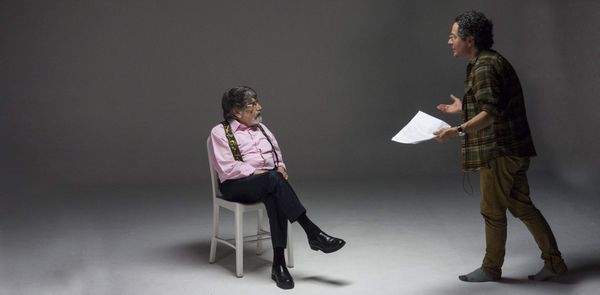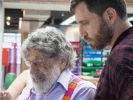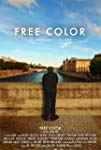Eye For Film >> Movies >> Free Color (2020) Film Review
Free Color
Reviewed by: Jennie Kermode

What is colour? Is it an innate property of an object or is it something that exists only in our brains when we look at that object? Venezuelan artist Carlos Cruz-Diez spent his lifetime wrestling with such questions. Alberto Arvelo's documentary followed him through the final year of his life as he focuses on a new project, perhaps his greatest challenge: to liberate colour from form.
As much about science as it is about art, this is a film centred on the act of enquiry, not simply observing Cruz-Diez as he asks questions but looking at how the process of questioning functions in art, at the exploratory journey an artist makes over the course of a lifetime. Cruz-Diez experienced this differently from many, avoiding extreme or unsettling experiences, seeking instead the serenity that stemmed from a happy, stable family life. Early on in this film he talks about the aggression present in our society as it is now, and about his desire to explore subtlety, to take things slowly, to investigate the nuances of colour in the hope of creating different ways of thinking that everyone can access.

Cruz-Diez's art has always been intended for public consumption. As he and others talk, Arvelo takes us on a visual tour of his past work and of the places he finds inspiring. Standing on a bridge over the Seine, the artist discusses his desire to create sudden ephemeral expressions of colour in outdoor spaces. He's a seeker after astonishment but for its own sake rather than for that of ego. We learn a little about his past through clips from old home movies, see the artistic community he created through family, knowing that he could never provide anything else. There's a sense, running throughout, of a planned life; he speaks of programming himself. "i am an artist 26 hours a day," he says, and lets us see what that means.
There are discourses on technique. Cruz-Diez introducs viewers directly to his work with coloured lines, showing us how changing just one can alter our experience of a whole image. Though they offer some escape from form, however, what he really wants is to generate colour in space. He's interested in the possibilities offered by magnetic fields but this is new technology, never before extended in this direction. Cruz-Diez isn't simply avant-garde - he's inwardly looking at things that cannot yet be expressed, inviting us to consider the art of the future and exerting a creative influence on the future in the process - opening up channels of enquiry that will still be yielding new ideas long after his death.
In any documentary of this sort there's a temptation either to bury oneself in the imagery or to stand back and try to regard it dispassionately, to give the viewer more room for interpretation. Arvelo does neither, instead using light and camera position to create subtle optical effects which let us explore Cruz-Diez's ideas in real time even in the most ordinary spaces. Ideas take precedence over completed works both the for the artist himself and for those viewers who choose to engage, to make an emotional connection with those subtleties of colour.
Everybody's emotional experience of colour is individual, Cruz-Diez notes. But that emotion isn't found in his works alone and it won't stay in the cinema. With or without the projected experiences he imagines, it's something that will stay with you when you leave the cinema, changing what you see in the wider world.
Reviewed on: 05 Jan 2020















